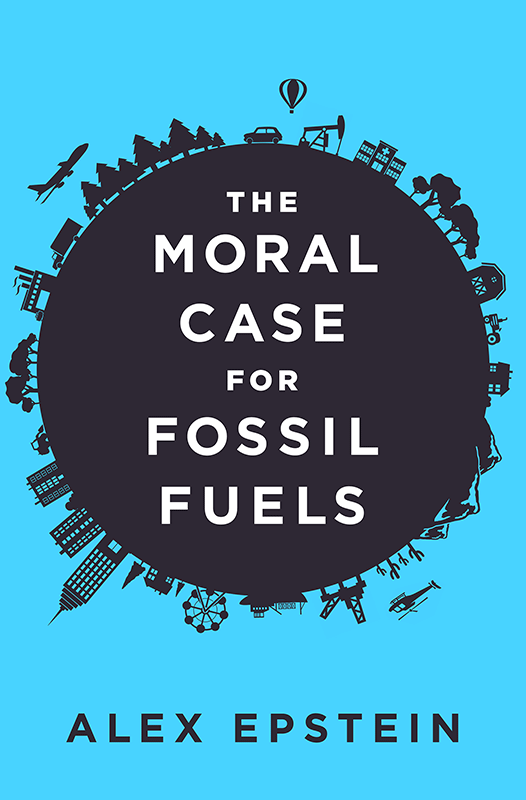On the broad spectrum of views on environmentalism, Alex Epstein would undoubtedly put himself at the very far extreme. Not only do we all owe a very big thank you to the fossil fuel industries but we should, for the good of humanity, be consuming more of the stuff. ‘There is no limit to how much cleaner and safer fossil fuel use can be’; we are becoming ‘masters of climate’ and our way of life will only improve if we do not succumb to ‘pernicious sustainability’ policies. ‘If you love enjoying nature, you should love fossil fuels,’ he says.
Buying Time
Let’s start with some positives about this book. Maybe it is true that the public in the ‘developed world’ does not fully understand – or appreciate – how much of their comfort, safety and personal freedom comes from fossil fuels. As Epstein argues (borrowing from Ridley’s The Rational Optimist), the energy packed into each tonne of hydrocarbons has bought us, as individuals, time; the ‘irreplaceable and unrepeatable’ resource ‘to guard jealously’.
But Epstein is a zealot, refusing to acknowledge any costs or potential risks. However open you are to his optimistic message, the book can’t be read without a feeling of being manipulated. It is a religious tract that studiously ignores and misrepresents inconvenient facts, in exactly the same way that he asserts environmentalists do.
Global North Perspective
Epstein’s arguments seem to be based on a few disconcerting premises. Although he pays lip-service to development issues, it is written from an absolute Global North perspective. He repeatedly asserts that fossil fuels are ‘cheap, plentiful and reliable’; not if you live in one of the world’s poorer countries, struggling to obtain dollars to buy oil or refined products.
 The IMF estimates that beyond the cost of the fossil fuels themselves, poorer countries spend $480 billion subsidizing fuel, a massive weight on their economies. To be part of the modern world is to be ‘hooked’ on fossil fuels, leading to perpetual trade imbalances and debt. This is true for both net energy-importing developed countries and the less developed. The deficit – and accruing debt – are simply better masked. Epstein’s rich country perspective is amplified with comments such as ‘Of course, there are places such as China that have high levels of smog’, and ‘human beings have generally thrived the warmer it has been’. His answer to increased temperatures is air conditioning; to rising sea levels, more sea defences; for other natural disasters we can just move. These answers don’t make sense if you are outside the world’s economic elite.
The IMF estimates that beyond the cost of the fossil fuels themselves, poorer countries spend $480 billion subsidizing fuel, a massive weight on their economies. To be part of the modern world is to be ‘hooked’ on fossil fuels, leading to perpetual trade imbalances and debt. This is true for both net energy-importing developed countries and the less developed. The deficit – and accruing debt – are simply better masked. Epstein’s rich country perspective is amplified with comments such as ‘Of course, there are places such as China that have high levels of smog’, and ‘human beings have generally thrived the warmer it has been’. His answer to increased temperatures is air conditioning; to rising sea levels, more sea defences; for other natural disasters we can just move. These answers don’t make sense if you are outside the world’s economic elite.
The ‘cheap and plentiful’ argument also ignores the ‘externalities’ that governments and individuals find themselves paying – pollution, congestion, poor health, corruption, inequalities. Epstein describes vividly the environmental disaster brought about in Batou, Mongolia, from the mining of rare earths, implying they are used only in wind farms, though these elements also go into GPS, cell phones and electric cars . This is, indeed, an issue that environmentalists should be more aware of – but the refusal to intelligently discuss pollution associated with fossil fuel usage undermines his argument.
Without a tax that adequately captures the ‘externalities’, it is almost impossible to compare the true costs of the energy resources we use. Epstein’s argument is based on the premise that we haven’t done much damage so far, so what’s the problem? He describes ‘the very mild warming trend overall – less than 1°C over a century’ as ‘unremarkable’. ‘In terms of the global climate system,’ he asserts, ‘scientists have not identified any significant impact’. Given this (highly contestable) analysis, he argues that we should ramp up consumption to industrialized-nation level world-wide, seemingly disregarding the real scientific position that there is much that we don’t know; the scientific argument is simply for the precautionary principle.
Missed Opportunity
Epstein implies that environmentalists are anti-development. He ignores the issue of the future affordability of fossil fuels, and does not consider the arguments of energy sovereignty or reduced reliance on global fuel markets that come with renewables. In fact, green economists argue that less developed countries should not be denied the advantages of the industrialized countries: the issues are about cutting waste and over-consumption in the Global North, while helping developing economies get access to energy to boost their independence and growth.
Fundamentally, Epstein’s argument contains all the errors he lays at the door of ‘greens’ – a lack of rigor, an extrapolation of the past to presume the future, and an unwillingness to allow for inconvenient truths. I doubt that this highly unbalanced, low-on-analysis tract has done the fossil fuel industries any favors. It feels like a missed opportunity to really focus on how we equalize the benefits of energy and industrialization across the world.





